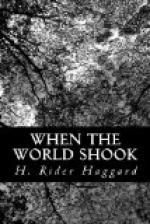One diversion we did have. About eleven o’clock a canoe came from the main island laden with provisions and paddled by Marama and two of his people. We seized our weapons, remembering our experiences of the night, but Marama waved a bough in token of peace. So, carrying our revolvers, we went to the rock edge to meet him. He crept ashore and, chief though he was, prostrated himself upon his face before us, which told me that he had heard of the fate of the sorcerers. His apologies were abject. He explained that he had no part in the outrage of the attack, and besought us to intercede on behalf of him and his people with the awakened god of the Mountain whom he looked for with a terrified air.
We consoled him as well as we could, and told him that he had best be gone before the god of the Mountain appeared, and perhaps treated him as he had done the sorcerers. In his name, however, we commanded Marama to bring materials and build us a proper house upon the rock, also to be sure to keep up a regular and ample supply of provisions. If he did these things, and anything else we might from time to time command, we said that perhaps his life and those of his people would be spared. This, however, after the evil behaviour of some of them of course we could not guarantee.
Marama departed so thoroughly frightened that he even forgot to make any inquiries as to who this god of the Mountain might be, or where he came from, or whither he was going. Of course, the place had been sacred among his people from the beginning, whenever that may have been, but that its sacredness should materialise into an active god who brought sorcerers of the highest reputation to a most unpleasant end, just because they wished to translate their preaching into practice, was another matter. It was not to be explained even by the fact of which he himself had informed me, that during the dreadful storm of some months before, the cave mouth which previously was not visible on the volcano, had suddenly been lifted up above the level of the Rock of Offerings, although, of course, all religious and instructed persons would have expected something peculiar to happen after this event.
Such I knew were his thoughts, but, as I have said, he was too frightened and too hurried to express them in questions that I should have found it extremely difficult to answer. As it was he departed quite uncertain as to whether one of us was not the real “god of the Mountain,” who had power to bring hideous death upon his molesters. After all, what had he to go on to the contrary, except the word of three priests who were so terrified that they could give no coherent account of what had happened? Of these events, it was true, there was evidence in the twisted carcass of their lamented high sorcerer, and, for the matter of that, of certain corpses which he had seen, that lay in shallow water at the bottom of the lake. Beyond all was vague, and in his heart I am sure that Marama believed that Bastin was the real “god of the Mountain.” Naturally, he would desire to work vengeance on those who tried to sacrifice and eat him. Moreover, had he not destroyed the image of the god of the Grove and borne away its head whence he had sucked magic and power?




